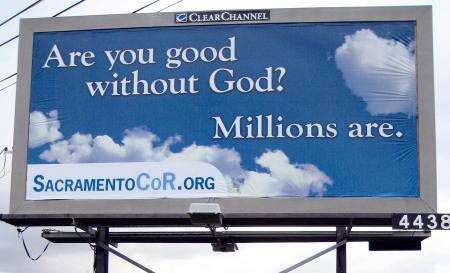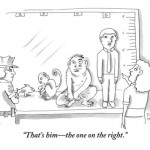In yesterday’s Sunday Review section of The New York Times, Susan Jacoby had an essay titled “The Blessings of Atheism.” She’s tackling the perceived absense of atheists and secular philosophy in moments of crisis. Here’s an excerpt, but my critique is about something missing in the piece, so you’d better read the whole thing to be fair.
One major problem is the dearth of secular community institutions. But the most powerful force holding us back is our own reluctance to speak, particularly at moments of high national drama and emotion, with the combination of reason and passion needed to erase the image of the atheist as a bloodless intellectual robot… The secular community is fearful of seeming to proselytize.
…Today’s secularists must do more than mount defensive campaigns proclaiming that we can be “good without God.” Atheists must stand up instead of calling themselves freethinkers, agnostics, secular humanists or “spiritual, but not religious.” The last phrase, translated from the psychobabble, can mean just about anything — that the speaker is an atheist who fears social disapproval or a fence-sitter who wants the theoretical benefits of faith, including hope of eternal life, without the obligations of actually practicing a religion. Atheists may also be secular humanists and freethinkers — I answer to all three — but avoidance of identification with atheism confines us to a closet that encourages us to fade or be pushed into the background when tragedy strikes.
We must speak up as atheists in order to take responsibility for whatever it is humans are responsible for — including violence in our streets and schools. We need to demonstrate that atheism is rooted in empathy as well as intellect. And although atheism is not a religion, we need community-based outreach programs so that our activists will be as recognizable to their neighbors as the clergy.
Finally, we need to show up at gravesides, as Ingersoll did, to offer whatever consolation we can.
The trouble is that, in the article, Jacoby never talks very much about what kind of consolation she’s got on tap. She mentions that not dealing with the problem of theodicy frees up atheists emotional and intellectual energies for more practical work and that death-as-non-existence eliminates suspense, but doesn’t offer anything further in this article that I can spot.
And, contra Samuel Freedman, I don’t think atheist and secular organizations are absent after tragedy. We know that secular groups and communities exist. Whether we’re religious or not, plenty of us participate in them (alumni networks, book clubs, amateur theatre troupes, folks volunteering together, etc). The article on restorative justice that moved me so much yesterday describes a purely secular system; the people using it were motivated by their faith, but the institution itself was totally secular. Jacoby is right that atheism doesn’t get credit for these groups in the way that religion does for church groups, but they are certainly evidence of people doing good without structuring it around God.
But these groups, whether explicitly linked to atheism or not, do have a certain hollowness. A lot of these associations are founded on storge, affection, the lowest of the loves in CS Lewis’s meditation The Four Loves. This kind of love is founded on long acquaintance which gives way to fondness. You may know each other just through one interest (e.g. bridge), but people brought together by circumstance do genuinely care for each other, and long association can provide a vernacular of shared references that promotes intimacy and fellowship after crisis.
(In the middle of an unpleasant fight with a classmate in college, I was greatly comforted by a friend quoting The American President to me. He was using the character’s lines as shorthand for a sentiment of support that might have sounded cloying or affected expressed in his own words. I was cheered both by the idea expressed and that the person knew me well enough to reach for this common point of reference).
But fondness and familiarity is different by being united by a common purpose or philosophy. In The Four Loves, C.S. Lewis describes philia (friendship) as a meeting of the minds:
Friendship arises out of mere companionship when two or more of the companions discover that they have in common some insight or interest or even taste which the others do not share and which, till that moment, each believed to be his own unique treasure (or burden). The typical expression of opening Friendship would be something like, “What? You too? I thought I was the only one.”
But groups founded around atheism or humanism are likely to be a diverse mix of moral philosophies. The definitions of humanism are always diffuse and bland enough to make room for everyone from Objectivists to Emma Goldman. It’s great to be pro-human, but at some point you’re going to have to specify what manner of things humans are and how we know what is good for us. Since many atheists groups are focused in activism, they’re more likely to touch on shared values than, say, Ravelry, but, since most of the most pressing fights for atheists are defensive, there still may not actually be much common ground beyond please, stop screwing with science class!
So, if groups focused on atheism are going to be sources of deep comfort for people in crisis, they probably need to factionalize a bit more. If you want someone to help you make sense of the world, you need some level of confidence you both share some axioms in your epistemology and ethics. And that’s a different and harder task than baking a casserole.

















